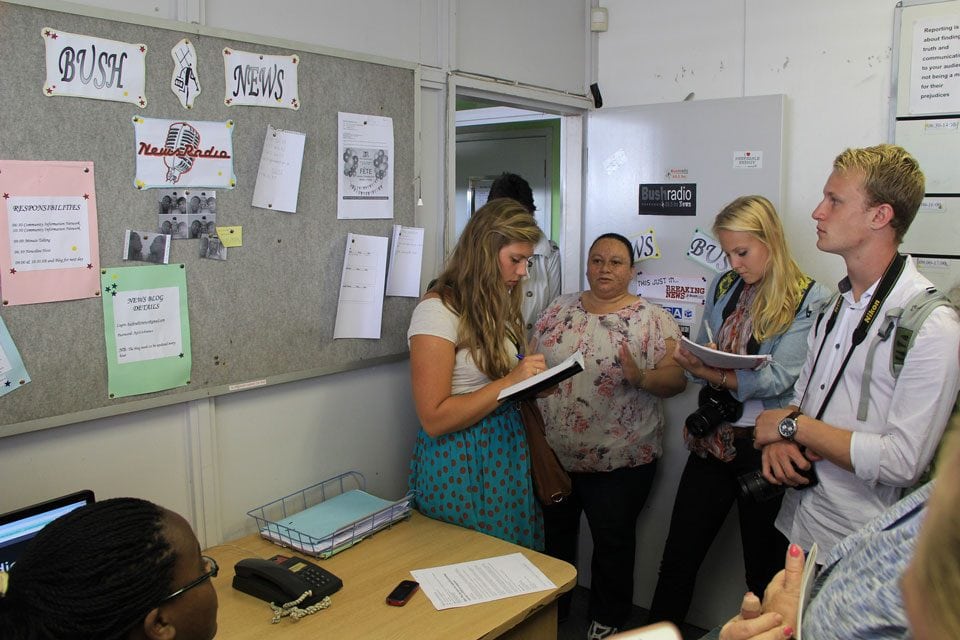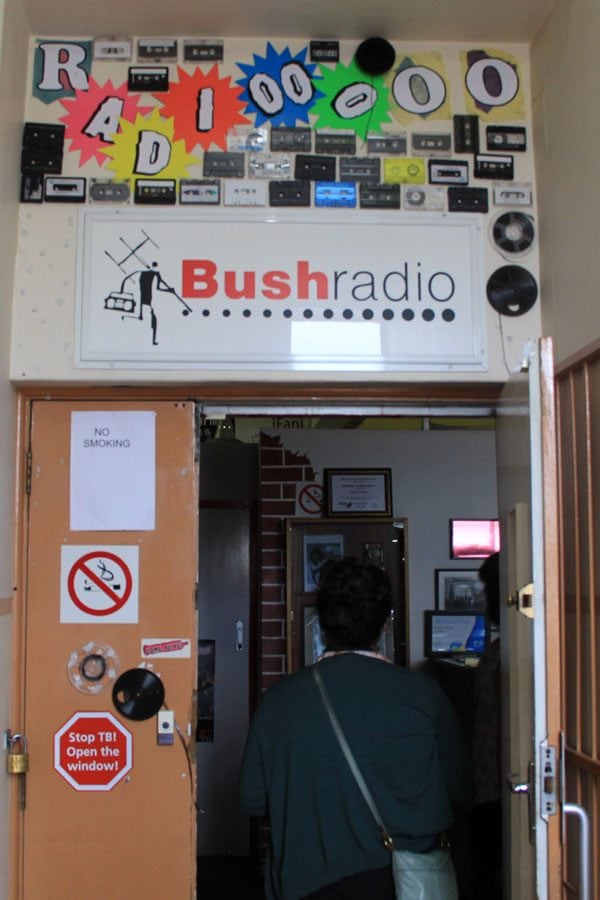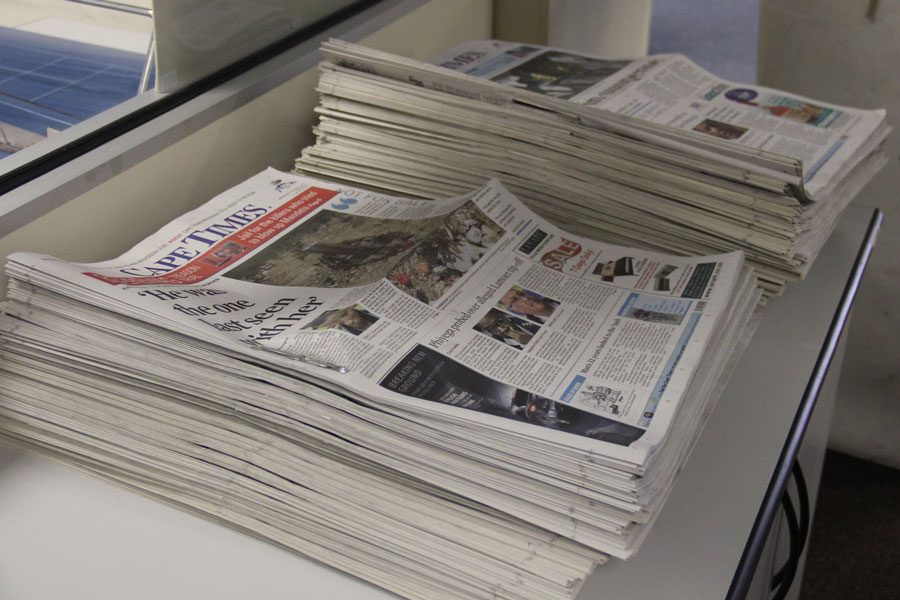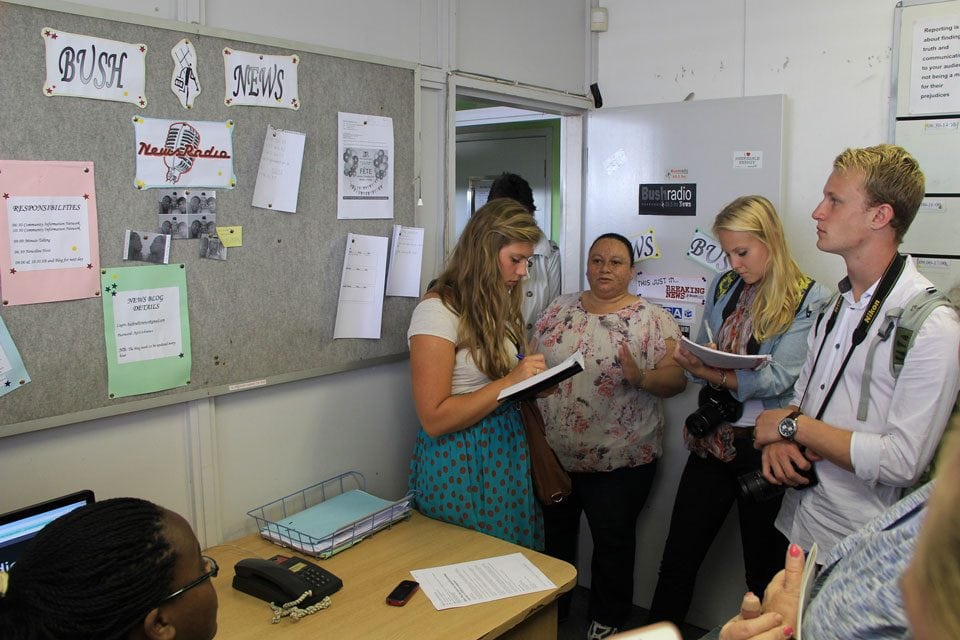
You’re tuning in live to Cape Town’s Bush Radio 89.5, pioneer community radio station, dedicated to giving the people a voice since 1993. With a range of local and international music, controversy sparking topics, and hard hitting news, you’ll want to stay tuned.
Students of Jessica Robert’s Journalism History and Ethics course filed in to the crowded space of On-Air Studio 1 at Bush Radio station for their field lab in Cape Town, South Africa. All semester, the class has focused on objectivity and the functions of journalism, making Bush Radio’s historical role in the anti-apartheid movement, and its current activism, an ideal learning environment.
Bush Radio improves the wellbeing of their community by initiating service projects and tailoring shows to educate their audience about topical issues. One show, called Job Shop, offers career advice and job openings to help listeners that can’t afford access to the newspaper classifieds.
“Bush Radio uses their airwaves to celebrate the history, culture, and language of their community and create critical thought and debate to encourage society to make informed decisions,” Brenda Leonard, a staff member, explained.
 Bush Radio is one of the first community radio projects in southern Africa. (Photo: Brian Cargill)
Bush Radio is one of the first community radio projects in southern Africa. (Photo: Brian Cargill)
The station’s duty to broadcast controversial topics related to lessons students in Prof. Roberts’ class learned on the role of journalism. Educating citizens and representing a range of voices in a culture were central to journalism objectivity.
“I was really impressed by the CREW program that they have for children,” said Shiloh Gulbranson, a senior at Winona State University. “I think it’s a great gateway for kids to stay off the streets and to learn how to better serve the community through broadcast media.”
The CREW show is engineered and hosted by children in grade school to high school and tackles tough issues that include gangsterism and teen pregnancy. Bush Radio officials believe children are capable of handing their own conflicts and the radio station provides the platform and tools to help them. Roberts’ students admitted that many of the radio stations they listened to in the U.S. didn’t have the same commitment to community.
The class continued on to experience journalism from a newspaper’s standpoint at the Cape Times headquarters. The Cape Times audience varies from the radio station’s, covering a greater range in economic status which is reflected by the content published.
“We stick to politics and business, and avoid the crime and grime,” Tony Weaver, Assistant Editor of Opinion, explained about the paper’s commitment to news neutrality.
While Bush Radio takes pride in their activist standpoint, Cape Times strives to publish articles void of political leaning, taking pride in the fact that all political parties show distaste towards the paper. Students drew several comparisons between radio and newspaper journalism in preparation for a class assignment.
“I knew that both organizations had vibrant cultures and a sense of public service, but were different enough in their approach, institutional structure, work routines, and audiences to give students an opportunity for comparison,” Prof. Roberts said about her field lab choice.
Running from meeting to meeting, selecting photos and coordinating advertisements for two publications a day on a deadline are only part of the daily tasks of a newspaper editor. Somehow, a few of the newspaper staff were able to take time out of their hectic schedule to answer some student questions.

“Objectivity is God,” Weaver stated. “During apartheid times the paper was more of an advocacy paper, but now facts are valued and strict.”
Being a journalist during apartheid meant facing government animosity and police brutality. Weaver’s stories as a correspondent during this time detailed confrontations with police, unjustified arrests, and covert cooperation with underground news sources.
During the Q&A, news was happening right outside the window as protestors assembled on the steps of the Provincial Government Building. Weaver’s voice was barely audible over the shouts and drums as he explained the protestors’ fight for better sanitation in the townships surrounding Cape Town. What better way for a journalism class to learn about a country’s news than to experience it first hand?
“In class we have talked about objectivity in news, but also about activism and advocacy in alternative journalism, and I hoped they would be able to see how both play a role in the function of these two organizations,” Prof. Roberts said. “Both have activist roots, and both were opposed to apartheid, but they differed in how they resisted apartheid, and in how they seek objectivity and see their roles today.”



